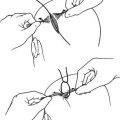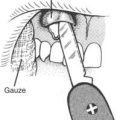PSYCHIATRIC EMERGENCIES
The wilderness experience can be quite stressful, and a member of the party may behave in an unusual fashion. This may be directly related to the events at hand or reflect an underlying psychiatric disorder. It is imperative that someone recognize warning signs early and evacuate anyone who cannot retain mental stability, to avoid placing the impaired individual and his traveling companions at risk for injury.
ANXIETY
Anxiety is the most common psychiatric symptom, and may range from appropriate and adaptive minor doubts about success to a full-blown panic reaction. Minor anxiety is expressed as general discomfort about a situation. The excessive worrier may become timid and withdrawn, and may lose his enthusiasm for participation. His anxiety may be clothed in criticism of plans or refusal to cooperate. It is important that every member of the expedition voice fears and objections at the outset, so as not to be caught in a panic when crossing treacherous terrain or performing rescues.
HYPERVENTILATION
One manifestation of anxiety that verges on panic is the hyperventilation syndrome, in which the victim, overcome by his fears, begins to breathe at an inappropriately rapid rate—40 to 100 times per minute. This causes the level of carbon dioxide in his blood to fall precipitously and to render the blood alkaline (from its normal neutral state). The symptoms are dizziness; fainting spells; numbness and tingling in the hands, feet, and around the mouth; muscle spasm in the hands and wrists; and, occasionally, seizures. If you are certain that the victim is hyperventilating because of anxiety (that is, there is no reason to suspect a collapsed lung, pneumonia, or other medical problem), place a paper bag or similar device over his mouth and nose for about 5 minutes. The victim breathes in and out of this bag (encourage “slowly and deeply”), and rebreathes his own expired carbon dioxide, allowing normalization of the level in the bloodstream and correction of the symptoms. At the same time, reassure the victim that he will be all right. Always pay close attention, as less oxygen is available to the victim while rebreathing from the bag, so do not use this technique for anyone with heart or lung disease. After the episode, make an attempt to identify the cause of the anxiety.
DEPRESSION
Depression occurs in the outdoor setting in response to situations that are perceived as hopeless. Some victims who are injured, lose their way, or are weakened by starvation and exposure may lose the will to continue. They become listless, fatigued out of proportion to their physical condition, uninterested, inattentive, without appetite, sleepy, and tearful. Clearly, the rescuer must encourage all party members to maintain their survival instincts, to continue to help others and to help themselves. In a cold environment, it is important to remember that hypothermia (see page 305) is a significant cause of apathy and should be corrected, if possible. An individual with chronic depression may go on a vacation trip with the enthusiastic expectation that his psychiatric disease will be alleviated or that his most recent depression has lifted. The sudden realization that such expectations are not fulfilled may put that person at risk for severe mood depression. Do not be afraid to inquire about a past history of psychiatric illness.
REACTION TO AN INJURY OR ILLNESS
Try to individualize your approach to each person. To best understand the changing needs of victims and families, try to maintain regular dialogue intended solely for the purpose of psychological support. Stay with the victim as much as possible. Use frequent touch and reassurances to relay your sense of concern and offer comfort. As best as possible, involve the victim in his treatment and rescue, so that his thoughts are attuned to survival rather than to fear or grief.





